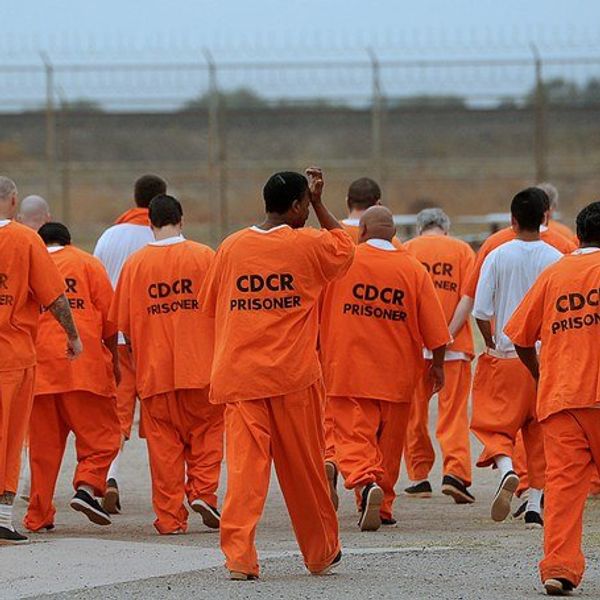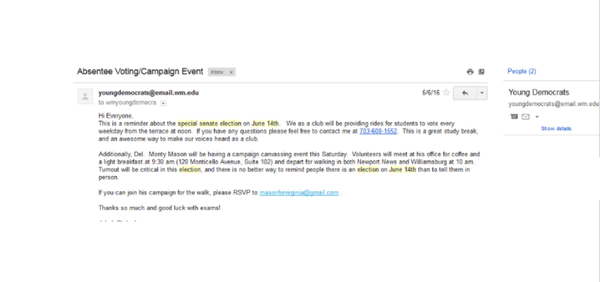Through the course of five brutally honest, widely enthralling, and at times, quite sobering seasons, "Orange Is The New Black" (OITNB) taught us all about the realities of incarceration in America. With her utilization of characters, whose stories each represented a particular facet of incarceration and the justice system, producer, and writer, Jenji Kohan, boldly exposed issues that have never once been in the forefront of American entertainment.
Kohan initially structured her series off the novel written by Piper Kerman, "Orange Is the New Black: My Year in a Women's Prison", but she eventually decided to expand the series beyond the confines of the novel as to include a larger range of issues.
Two of these issues, that have since found themselves at the core of the narrative, are disproportionate minority contact with the criminal justice system and the privatization of the prison industry.
The latest season, which premiered June 9, further exemplified the myriad of concerns associated with private prisons in a large-scale prison riot. Various inmates worked with negotiators representing MCC (the privatized prison cooperation that takes over Litchfield in season three) to affect change in how the prison operated. These demands ranged from better food and healthcare to better work and GED programs.
While the plight of prison life has become a somewhat enchanting subject to its viewers, the issues examined in the series are much more than fodder for the curious; they're a profound reality for 2.2 million incarcerated individuals in the U.S. 'OITNB' offers an unprecedented and widely popular exposé on prison life, but its purpose is simply moot if its viewers leave their shock and vexation with the ending credits.
For profit prisons are a problem, a real problem, that exists outside the realm of television and heartfelt comedy; and the demands featured in this newest season are real, legitimate concerns that are felt by an ever growing female prison population. And while you may have laughed at the seemingly trivial demand of tampons, all triviality is lost when it comes to reality.
So now that we've abandoned the blithe context of television, let's have a real discussion about the privatization of prisons and why 'OITNB' is much more than binge worthy fodder.
What are private prisons in the first place?
In 1983 three men by the names of Thomas Beasley, Doctor R. Crants and T. Don Hutto found the first private prison corporation, Corrections Corporation of America (later renamed CoreCivic). Private prisons initially began as a way to cut costs when it came to incarcerated individuals, as the financial burden lay on a private corporation as opposed to the government.
However, the government still retains full control of running and overseeing the prison. This means that every facet of the prison is outsourced to a private corporation, such as healthcare and food, while the government still assumes its responsibility of incarcerating offenders.
Despite what many may presume based on its name, private prisons are not actually operated by private corporations, but that does not detract from the fact that such prisons are still run in a very mechanical, business-like way.
How do private prisons make money?
While the goal of public prisons varies from incapacitation to rehabilitation, the goal of private prisons is to make a profit off the backs of incarcerated individuals. To do this, private prisons receive stipends, a fixed sum of money, per inmate within the facility or based on the size of the facility.
Since more inmates equal more profit, it's most advantageous for private prisons to fill their prisons to full capacity-- which they insure through a piece of legislation intended to sustain mass incarceration.
Major players in the private prison industry.
Corrections Corporation of America (CoreCivic):
Size: 61 correctional facilities with a maximum capacity of 80,000+ beds.
Net worth: $1.736 billion in yearly revenue, 162.5 million in net income.
Size: 57 facilities with a maximum capacity of 49,000 beds.
Net worth: $2.18 billion in annual revenue, and $148.72 million in net income.
Both CoreCivic and Geo Group's stocks have dipped and soared through the years, with its peak year being 1997. In 2016, just as his term was concluding, President Barack Obama began the process of phasing out private prisons, as he decided to "better allocate our resources to ensure that inmates are in the safest facilities and receiving the best rehabilitative services". During this time, stocks for both corporations began to plummet, but have since risen since President Donald Trump took office. This follows his rescinding of Obama's stride towards diminishing privatization of the prison industry.
Currently, both CoreCivic and GeoGroup are predicted to fully recover, as stock prices are on the rise.
The politics of private prisons.
Like many issues, the issue of privatization of prisons has become a heavily polarized, partisan issue, with proponents generally on the right, and opponents on the left. To ensure protection, both Geo and CCA (CoreCivic) have funneled a combined $10 million to selected candidates since 1989, and have spent nearly $25 million on lobbying.
Private prison corporations have woven themselves so deep into politics that regardless of which party is at the forefront, their political influence is sure to remain. A majority of Geo and CCA's lobbying efforts are done through American Legislative Exchange Council (A.L.E.C.).
A.L.E.C. is a non-profit organization comprised of conservative state legislators and private sector employees that draft pieces of legislation for U.S. state governments. A.L.E.C. is responsible for some of the harshest sentencing laws in the country-- laws that helped facilitate the mass incarceration that is occurring today.
Some of these laws include mandatory minimum sentences, "three strikes" laws (upon your third offense, only one of which is required to be violent, offenders will be sentenced to life) and "truth in sentencing laws" (which strives to keep offenders behind bars for majority, or all, of their assigned sentence without the possibility of parole).
Such laws only serve to perpetuate mass incarceration, while largely disrupting communities of color and lower socio-economic worth. On all three occasions, Geo Group and CCA were at the forefront of lobbying efforts, and on all three occasions, both corporations stood to reap enormous benefits of an enhanced prison population. Despite their stated purpose, these laws are not intended to curb crime or deter offenders-- but is a way to ensure that prisons reach their full capacities. Additionally, A.L.E.C. is an active proponent of privatization and works to further privatization efforts across the country.
The effects of privatization.
As OITNB expertly portrays, life in a private prison is harsh at best, and downright inhumane at times. And while prisons are not designed to be comfortable, private prisons are often cited as too harsh-- even for maximum security inmates.
To save money, private prisons hire inexperienced and under-qualified guards, whose training they keep to a minimum. This is depicted in OITNB perfectly-- as the guards hired in were not properly vetted or prepared for the job they were trying to preform. When the wrong guards are hired, inmate to guard relationships are compromised, which can lead to insubordination, abuse, misconduct, and even rioting (as shown in OITNB). Additionally, poor training and improper hiring can lead to high turnover rates, as tensions can become too much to bear.
As some studies indicate, private prisons exhibit higher levels of inmate abuse than public institutes. This, too, is depicted in OITNB through the routine sexual abuse from C.O. Coates to inmate Pansentucky, and later the murdering of Pousay by one of the guards.
Healthcare also pays the price when its privatized. In one instance, sugar packets donated from McDonald's were used in leu of antiseptics or antibiotics when an inmate caught an infection from a c-section preformed in a private prison. The inmate, Regan Clarine, also asserted that the prison doctors handling her c-section were not trained in stitching wounds, so they simply covered the wound with butterfly bandages. When infection set in, Clarine was not taken to the prison hospital until two weeks afterward, following weeks of requests and agony.
It has also been widely reported that many private prisons offer energy drinks to inmates as a way of exclusively treating serious ailments like cancer, or in the case of Tony Brown, weak pain pills.
During his incarceration at a private prison in Arizona, Brown had been diagnosed with esophageal cancer. He received no formal treatment, but was prescribed morphine to combat the pain. However, when that ran out due to poor funding, Brown was prescribed weak pain killers instead. Various guards and nurses cited that Brown would often writhe out in pain, requesting assistance he rarely received. Even as he lay dying in his cell, an ambulance was not called until 40 minutes following nurse administered CPR. However, Brown is only one death among 50 others in Arizona's privatized prison industry.
Since profit is the end goal for private prisons, many prisons seek to eliminate prison programs that are vital to the rehabilitation of offenders, such as therapy and GED programs. Rehabilitative and educational programs are often substituted with small skills labs that teach inmates basic skills like gardening and labor-- but are often viewed as a guise to receive free labor from inmates. In the latest season of OITNB, Taystee works with negotiators to reinstate the GED program, but fails to actually do so.
A major issue discussed in OITNB is the quality of the food served in private prisons. This, too, is reminiscent f private prisons across the U.S. and is just another way to save money. The company that is largely responsible for food in private prisons is Aramark, which as been accused of serving food with maggots in it in various private prisons.
And if prison labor wasn't bad enough, private prisons dish out far less to its working prison populations for far more labor intensive jobs.
Straying from the norm, OITNB provides its viewers with a vividly accurate portrait of life inside a private prison. As a viewer, it's easy to passively ignore the travesties before us at it plays out on our television screens-- it's easy to think their experiences are overly dramatic figments of a fictional narrative, but they're not. Their experiences are real, and are happening in private prisons around the U.S. everyday.





















